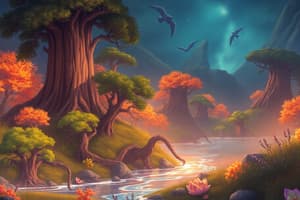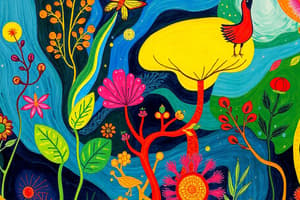Podcast
Questions and Answers
Which of the following is NOT a primary focus in the study of ecology?
Which of the following is NOT a primary focus in the study of ecology?
- The study of individual organism's anatomy and physiology. (correct)
- The flow of energy and cycling of nutrients in ecosystems.
- The interactions between organisms and their physical environment.
- The complex relationships between various species in a community
At which level of ecological organization would you primarily study a group of zebras interacting in the same savanna?
At which level of ecological organization would you primarily study a group of zebras interacting in the same savanna?
- Organism
- Community
- Population (correct)
- Ecosystem
Which ecological level of organization encompasses the interactions between all living organisms and their physical surroundings, including climate and nutrients, within a defined area?
Which ecological level of organization encompasses the interactions between all living organisms and their physical surroundings, including climate and nutrients, within a defined area?
- Population
- Community
- Biosphere
- Ecosystem (correct)
What is the most accurate description of 'nutrient cycling' in an ecological context?
What is the most accurate description of 'nutrient cycling' in an ecological context?
What does 'adaptation', as understood in ecology, primarily reflect?
What does 'adaptation', as understood in ecology, primarily reflect?
Which concept in ecology is most closely associated with the maximum population size an environment can sustainably support?
Which concept in ecology is most closely associated with the maximum population size an environment can sustainably support?
Which of the following scenarios best represents the concept of ecological succession?
Which of the following scenarios best represents the concept of ecological succession?
If a particular resource is considered a 'limiting factor' for a specific population, what does this imply?
If a particular resource is considered a 'limiting factor' for a specific population, what does this imply?
Flashcards
What is Ecology?
What is Ecology?
The scientific study of the relationships between organisms and their surroundings, encompassing both living (biotic) and non-living (abiotic) factors.
Organism
Organism
The study of individual organisms' adaptations and behaviors in their environment.
Population
Population
Examines groups of individuals of the same species interacting in a specific area.
Community
Community
Signup and view all the flashcards
Ecosystem
Ecosystem
Signup and view all the flashcards
Biosphere
Biosphere
Signup and view all the flashcards
Energy Flow
Energy Flow
Signup and view all the flashcards
Nutrient Cycling
Nutrient Cycling
Signup and view all the flashcards
Study Notes
Defining Ecology
- Ecology is the scientific study of the relationships between organisms and their environment.
- It encompasses the interactions among organisms and their physical surroundings, including both biotic (living) and abiotic (non-living) factors.
- This includes the study of how organisms obtain energy, how they interact with each other, and how they adapt to their environments.
- Ecology investigates the complex web of life on Earth, from individual organisms to entire ecosystems.
Levels of Organization in Ecology
- Ecology examines biological systems at different scales, from individual organisms to the biosphere.
- Organism: Focuses on the adaptations and behaviors of individual organisms.
- Population: Examines groups of individuals of the same species interacting in a specific area.
- Community: Involves the interactions among different species within a given area.
- Ecosystem: Considers the overall dynamic relationships between living organisms and their physical environment (e.g., climate, nutrients, water availability).
- Biosphere: Encompasses the global network of all ecosystems on Earth.
Key Concepts in Ecology
- Energy Flow: Studies the transfer and transformation of energy through trophic levels (e.g., producers, consumers, decomposers). Sunlight is the ultimate source of energy for most ecosystems.
- Nutrient Cycling: Examines the movement of essential chemical elements (e.g., carbon, nitrogen, phosphorus) through the environment, often involving both biotic and abiotic components.
- Biodiversity: Explores the variety of life at all levels, from genes to ecosystems. High biodiversity supports ecosystem stability and resilience.
- Adaptation: Studies how organisms evolve to better survive and reproduce in their environment based on natural selection.
- Interactions: Examines the interplay between different species. This includes predation, competition, mutualism, and commensalism.
- Limiting Factors: Investigates factors (e.g., resources, space, weather) limiting population growth and distribution.
- Carrying Capacity: The maximum population size an environment can sustainably support.
- Succession: The gradual process of change in an ecosystem over time.
Scope of Ecological Study
- Ecologists study a wide range of topics, from the behavior of individual animals to the global effects of climate change.
- These studies inform the management and conservation of natural resources, agriculture, and pollution control.
- Applications include disease transmission modelling, predicting population change, and developing sustainable food production strategies.
- Conservation biology and restoration ecology are subfields heavily reliant on ecological principles.
Studying That Suits You
Use AI to generate personalized quizzes and flashcards to suit your learning preferences.




